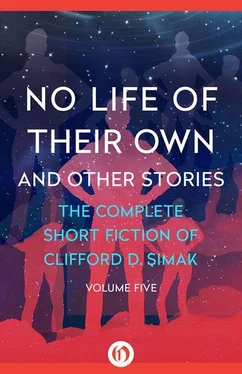But there were other things. Meteors, for one, and you couldn’t do much about them. Not until someone designed a screen, and no one had. Radiations were another. Space was full of radiations and, despite the insulating jacket of ozone some of them seeped through.
Scott climbed through the rocket valve and turned to close it. He hesitated for a moment, drinking in the smell and sight of Earth. There wasn’t much that one could see. The anxious face of Alexander, the huddled shadows that were watching men, the twinkling base camp lights.
With a curse at his own weakness, Scott slammed the valve lock, twirled it home.
Fitting himself into the shock absorbent chair, he fastened the straps that held him. His right foot reached out and found the trip that would fire the rockets. Then he lifted his wrist in front of his eyes and watched the second hand of the watch.
Ten seconds. Eight. Now five. The hand was creeping up, ticking off the time. It rested on the zero mark and he slammed down his foot. Cruel weight smashed down upon him, driving his body back into the padded chair. His lungs were flattened, the air driven from them. His heart thumped. Nausea seized him, and black mists swam before his eyes. He seemed to be slipping into a midnight chasm and he cried out weakly. His body went limp, sagging in the chair. Twin streams of blood trickled from his nose and down his lip.
He was far out in space when he struggled back to consciousness. For a time he did not stir. Lying in the chair, it took long minutes to realize where he was. Gradually his brain cleared and his eyes focused and made impressions on his senses. Slowly he became aware of the lighted instrument board, of the rectangle of quartz that formed the vision panel. His ears registered the silence that steeped the ship, the weird, deathly silence of outer space.
Weakly he stirred and sat upright, his eyes automatically studying the panel. The fuel pressure was all right, atmospheric pressure was holding, speed was satisfactory.
He leaned back in the chair and waited, resting, storing his strength. Automatically his hand reached up and wiped the blood from his lips and chin.
II
He was in space. Headed for the Moon and from there for Mars. But even the realization of this failed to rouse him from the lethargy of battered body and tortured brain.
Taking off in a rocket was punishment. Severe, terrible punishment. Only men who were perfect physical specimens could attempt it. An imperfect heart would simply stop under the jarring impact of the blast-off.
Someday rockets would be perfected. Someday rockets would rise gently from the Earth, shaking off Earth’s gravity by gradual application of power rather than by tremendous thrusts that kicked steel and glass and men out into space.
But not yet, not for many years. Perhaps not for many generations. For many years men would risk their lives in blasting projectiles that ripped loose from the Earth by the sheer savagery of exploding oxygen and gasoline.
A moan came from the rear of the ship, a stifled pitiful moan that brought Scott upright in the chair, tearing with nervous hands at the buckles of his belt.
With belt loosened, body tensed, he waited for a second, hardly believing he had heard the sound. It came again, a piteous human cry.
Scott leaped to his feet, staggered under the lack of gravitation. The rocket was coasting on momentum now and, while its forward motion gave it a simulation of gravity, enough so a man could orient himself, there was in actuality no positive gravity center in the shell.
A bundle of heavy blankets lay in a corner formed by a lashed down pile of boxes … and the bundle was moving feebly. With a cry in his throat, Scott leaped forward and tore the blankets aside. Under them lay a battered man, crumpled , with a pool of blood soaking into a blanket that lay beneath him. Scott lifted the body. The head flopped over and he stared down into the vacant, blood-streaked face of Jimmy Baldwin.
Jimmy’s eyes fluttered open, then closed again. Scott squatted on his heels, wild thoughts hammering in his head. Jimmy’s eyes opened again and regarded the pilot. He raised a feeble hand in greeting. The lips moved, but Jimmy’s voice was faint.
“Hello, Scott.”
“What are you doing here?” Scott demanded fiercely.
“I don’t know,” said Jimmy weakly. “I don’t know. I meant to do something, but I forgot.”
Scott rose and took a bottle of water from a case. Wetting his handkerchief, he bathed the bloodied face. His hands ran over Jimmy’s body but found no broken bones. It was a wonder the man hadn’t been killed outright. Some more Baldwin luck!
“Where are we, Scott?” Jimmy asked.
“We’re in space,” said Scott. “We’re going out to Mars.” No use of telling him anything but the truth.
“Space,” said Jimmy. “I use to go out in space. Then something happened.” He shook his head wearily. Mercifully, the memory of that something had been wiped from his brain.
Half dragging, half carrying, Scott got him to the assistant pilot’s seat, strapped him in, gave him a drink of water. Jimmy’s eyes closed and he sank back into the cushions. Scott resumed his chair, leaned forward to look out into space.
There was little to see. Space, viewed from any angle, unless one was near a large body, looked pretty much the same. The Moon was still out of his range of vision. It would be hours before it would move upward to intersect the path of the rocket’s flight.
Scott leaned back and looked at Jimmy. Apparently the man had sneaked aboard just before the take-off. No one paid much attention to him. Everyone was kind to him and he was allowed to do as he pleased. For he was not insane. The tragedy of those few minutes years before had merely wiped out his memory, given him the outlook of a child.
Perhaps when he had gotten into the ship he had held some reason for his action, but now even that purpose had escaped him. Once again Jimmy Baldwin was a bewildered child’s brain in the body of a man.
“Anyway,” said Scott, half speaking to himself, half to the silent form, “you’re the first rocket stowaway.”
They would miss Jimmy back at the camp, would wonder what had happened to him. Perhaps they’d organize a posse and search for him. The possibility was they would never know what happened, for there was slight chance, Scott told himself, that he or Jimmy or the ship would ever get back to Earth again.
Someone else would have to tend Jimmy’s flowers now, but probably no one would, for his flowers were the Martian lilies. And Martian lilies no longer were a novelty.
It had been the lilies that started the whole thing, this crazy parade of men who went into space and died.
Slightly over twelve years ago, Dr. Steven Alexander reported that, from his observatory on Mt. Kenya, he had communicated with Mars by ultrashort wave radio. It had been a long and arduous process. First the signals from Earth, repeated in definite series, at definite intervals. And then, finally, the answer from the Red Planet. After months of labor slow understanding came.
“We send you,” signaled the Martians. “We send you.” Over and over again. A meaningless phrase. What were they sending? Slowly Alexander untangled the simple skein of thought. Mars finally messaged: “We send you token!” That word “token” had been hard. It represented thought, an abstract thought.
The world waited breathlessly for the token. Finally it came, a rocket winging its way across space, a rocket that flashed and glinted in the depth of space as it neared Earth. Kept informed of its location by the Martians, Earth’s telescopes watched it come. It landed near Mt. Kenya, a roaring, screaming streak of light that flashed across the midnight sky.
Читать дальше












